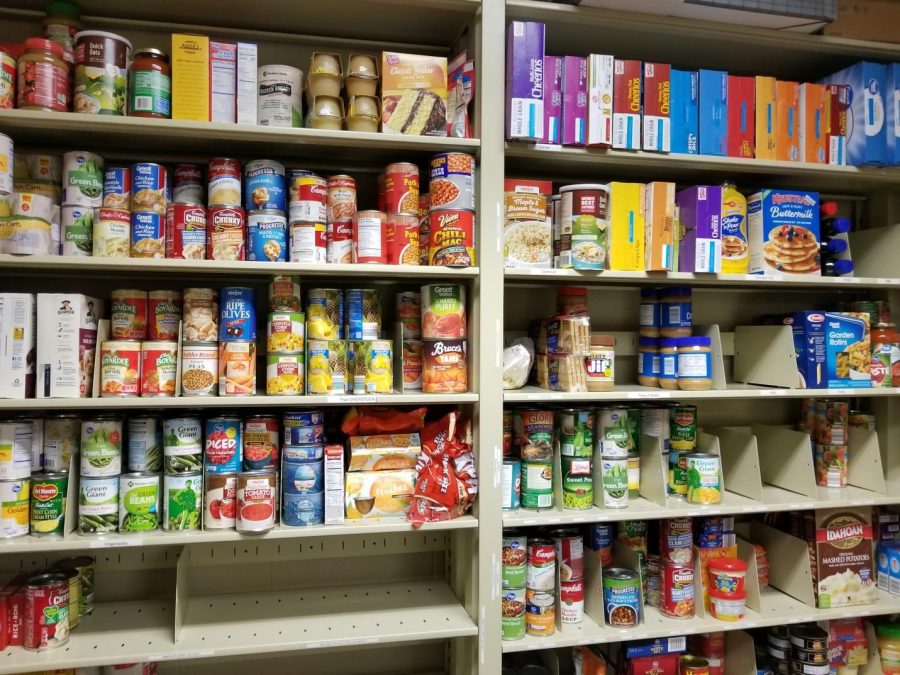Food Insecurity: How is hunger affecting IUS students
A look at how food insecurity is affecting students on campus and what’s being done to support students in need
Inside the IUS food pantry.
November 29, 2018
Food insecurity is the lack of stability in one’s food supply. For many, the reliability of their next meal isn’t so solid.
This idea may bring to mind images of people starving in other parts of the world, or people you see when volunteering at a soup kitchen at Thanksgiving. However, food insecurity is affecting people all across America, and college students are part of this group.
College students are increasingly unable to meet their basic needs – including food costs. Students are reaching out to food pantries, applying for food stamps and at times, skipping meals. The Horizon asked staff at IU Southeast and other local agencies how they are helping to ensure students get the nutrition they need and how the community can help close these gaps.
Karen Richie, counselor and care manager at IU Southeast, said that as more students are accepted into college, more individuals who are at risk of going hungry are being admitted.
“College used to be for people who could afford it,” Richie said. “Therefore, they didn’t have to worry about students going hungry. But now, we want everyone to go to college, so obviously we will accept students who may not have family support or who may have to focus on other bills instead of food.”
Richie said that New York recently passed a state mandate that requires all college campuses to have a food pantry on campus. This shows that there is an understanding across the country that these resources are becoming more necessary in order to help students succeed in school.
How are students on campus affected?
The IUS food pantry is located on the second floor of UC South. The food pantry not only has non-perishable food items, but some personal care items and clothing as well. Supported by donations, Richie recognized a need for a food pantry when talking to another faculty member about a student who had lost their job and became homeless.
“The student ended up sleeping in her car, and struggling in a class that she had been excelling in,” Richie said. “We had fantastic faculty awareness, they checked in on her and found out that she was going through this.”
This incident is how Richie’s job was created. A faculty member went to the faculty senate because they thought that student wasn’t the only one struggling. A social worker position was created in order to have a dedicated faculty member who is able to help students find the resources they need.
The IU Southeast food pantry is stocked with donations. Different schools or departments on campus will host food drives to help stock the pantry, or individuals and groups will give money in order to purchase food.
If the IUS pantry receives something students may not use, such as a 10 pound can of green beans, Richie will donate it to a local food pantry or soup kitchen that will use it.
Richie says the Empty Bowls fundraiser is a favorite of hers. The Ceramics students made the bowls and sold them for $15 each. A voucher for a free bowl of soup from the IUS food court was given with each bowl purchased. The first fundraiser raised over $1,200 for the food pantry.
Other Community Efforts
Dare to Care, located in Louisville, is working to help college students in Louisville overcome hunger by partnering with one local college to help support students in need. Stan Siegwald, director of strategic initiatives for Dare to Care, said they are working to address the issue of food insecurity in college students.
“The issue of college students struggling to make ends meet has been a conversation with people in social services over the past year. We’re trying to figure out how we can better address it.”
Some colleges have space and resource limitations, so that is a factor when deciding how to help college students. They may not have space to hold a large amount of food, or they may not have a place to refrigerate food.
One pilot that Dare to Care is working on is a possible collaboration with Jefferson Community and Technical College. They hope to have a food pantry on their downtown campus.
A Widespread problem
Still Hungry and Homeless in College, a survey of 43,000 students from 66 institutions across 20 states, was administered by The Wisconsin Hope Lab. The Hope Lab does research on low-income students in order to turn them into policies that improve their outcomes in post-secondary schools. The survey found that 36% of students who responded have been food insecure, meaning that they did not know where their next meal was coming from, at some point within the 30 days prior to completing the survey.
Colleges such as IU Southeast are using information like this to help improve the lives of their students.
Richie said she wants to make sure students know that if they are ever in need of food, she will make sure they eat.
“If you are hungry, I will feed you. If you’re at a point where you have $20 and you have to decide between gas to get to work or food for the week, get the gas and I’ll help you with food.” Richie said.


